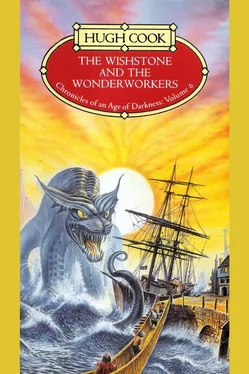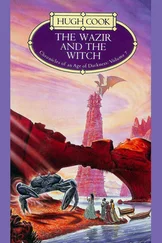Hugh Cook - The Wishstone and the Wonderworkers
Здесь есть возможность читать онлайн «Hugh Cook - The Wishstone and the Wonderworkers» весь текст электронной книги совершенно бесплатно (целиком полную версию без сокращений). В некоторых случаях можно слушать аудио, скачать через торрент в формате fb2 и присутствует краткое содержание. Жанр: Фэнтези, на английском языке. Описание произведения, (предисловие) а так же отзывы посетителей доступны на портале библиотеки ЛибКат.
- Название:The Wishstone and the Wonderworkers
- Автор:
- Жанр:
- Год:неизвестен
- ISBN:нет данных
- Рейтинг книги:4 / 5. Голосов: 1
-
Избранное:Добавить в избранное
- Отзывы:
-
Ваша оценка:
- 80
- 1
- 2
- 3
- 4
- 5
The Wishstone and the Wonderworkers: краткое содержание, описание и аннотация
Предлагаем к чтению аннотацию, описание, краткое содержание или предисловие (зависит от того, что написал сам автор книги «The Wishstone and the Wonderworkers»). Если вы не нашли необходимую информацию о книге — напишите в комментариях, мы постараемся отыскать её.
The Wishstone and the Wonderworkers — читать онлайн бесплатно полную книгу (весь текст) целиком
Ниже представлен текст книги, разбитый по страницам. Система сохранения места последней прочитанной страницы, позволяет с удобством читать онлайн бесплатно книгу «The Wishstone and the Wonderworkers», без необходимости каждый раз заново искать на чём Вы остановились. Поставьте закладку, и сможете в любой момент перейти на страницу, на которой закончили чтение.
Интервал:
Закладка:
A private audience with Justina, oh yes, that was the way. He could say everything, confess all, knowing it would not be near instantly the common talk of the streets. Under such circumstances he would count it both a pleasure and a privilege to bare his soul to his Empress. Justina the merciful! Justina the good! Most saintly of rulers, most blessed of lawmakers!
One need not search far to find the sources of such extravagant royalism. It was, after all, the Family Thrug which had overthrown Wazir Sin, that dedicated pogromist who had made it his business to wipe out Ebbies first then others afterwards. If it had not been for the intervention of Lonstantine Thrug and Justina’s subsequent adherence to her father’s policies then Chegory Guy would still have been living as a hunted animal in the wastelands of Zolabrik. Hence young Chegory was a patriot, a royalist, and a staunch supporter of imperial rule.
Chegory waited impatiently while the Empress dealt with one petitioner after another. Then he was astonished to see someone he recognised stepping forward to declare himself.
He was astonished?
Why, you ask, was he astonished?
After all, he was an Ebrell Islander, hence drug-dealers and law-breakers of all descriptions were his common companions. Surely he could have been expected to recognise many a petition-pleading miscreant on a day so busy. If you have prejudged young Chegory thus then your prejudices are not misplaced, for, as this chronicle has demonstrated already, he was typical of his kind. Nevertheless, his astonishment was fully justified, for the man instantly standing before the Empress Justina was no ordinary petitioner.
No, this was the elven lord whom Chegory had met Downstairs in the night just gone. Or, rather, this was the individual whom Chegory had misidentified as an elven lord on the strength of the glittering fish-scale armour he had been wearing in the underworld. The man in question was actually Pelagius Zozimus, a wizard of the order of Xluzu and the quest-companion of Guest Gulkan (pretender to the throne of Tameran), Hostaja Sken-Pitilkin (a fellow wizard) and Thayer Levant (a cut-throat from Chi’ash-lan).
For the Petitions Session, Pelagius Zozimus had abandoned his miraculous fish-scale armour in favour of an unadorned light green ankle-length robe. A linguist had already established his competence in Toxteth, and even now a guard was using that language to ask Chegory’s ‘elven lord’ the standard question:
‘Have you in your voluntary or involuntary possession any knife, bodkin, knitting needle, dragon hook, sword, spear, bow, catapult, arbalest, fighting stick, battering ram, snake, scorpion, basilisk, vial of vitriol or other weapon of death or terror or violence?’
Whereupon Zozimus answered in the negative, was subjected to a swift but expert search, then was allowed to step closer (but not too close!) to the Empress. The Imperial Linguist stepped forward with him. Both elven lord and linguist bowed.
‘Toxteth,’ said the linguist, then bowed again and withdrew.
Chegory was appalled to see the elven lord standing almost within striking distance of the Empress Justina. Alone and unaccompanied. What designs did the alien uitlander have upon his beloved Empress. What treason was here afoot?
The elven lord bowed once more.
‘Speak,’ said Justina, for such was her style.
‘Fair star of Injiltaprajura,’ said he, ‘most gracious of the daughters of Wen Endex, most-’
‘Yes, yes,’ said Justina, impatiently, ‘I’ve heard all that before. Tell me something I don’t know. Get down to business, man!’
‘I crave forgiveness for sins enormous, for crimes near unpardonable,’ said the elven lord.
Chegory relaxed. So the miscreant was going to confess all. He was going to admit to the Empress that he had come to Injiltaprajura to try to seize the wishstone. Chegory knew that to be the ruling purpose of the elven lord and his companions for they had told him as much after they had captured him Downstairs.
‘Crave on,’ said the Empress.
‘My name is Pelagius Zozimus,’ said the elven lord. ‘Long have I dwelt in the wastelands of the Scorpion Desert. There, to my sorrow, I have served the evil warlord Jal Japone. His employ have I deserted, here to come to crave forgiveness.’
‘How did you serve Japone?’ said the Empress.
‘I was his chief of cookery,’ said Pelagius Zozimus, ‘for there lies my talent. I’m a master chef, the unsurpassed lord of twenty-seven styles of culinary delight. I hear my ladyship has a vacancy for such a one.’
‘Why, so we do,’ said the Empress, delight speaking itself plain across her face. ‘Pardoned and employed! My major domo will show you-’
‘Ware!’ shouted a guard. ‘An Ebby!’
For Chegory Guy was plunging toward the throne. Murder was writ clear in his countenance. His intent was to see this Zozimus dead that very day quarter. To denounce the fraudulent thief who had with breathtaking audacity cozened his way into the bosom of the imperial household. To swear that Zozimus was no servant ofjapone but a rapacious reaver from across the seas, a conspirator in league with vermin more dangerous yet.
Such was Chegory’s intent.
But before the young Ebrell Islander could get anywhere near the throne he was set upon by guards, seized, inverted, punched, booted, slapped, and deprived of his sole weapon — the knife he had found Downstairs and had secreted in a boot sheath.
‘A blade!’ shouted a soldier, brandishing the weapon for all to see.
At the sight of it, the corpse master Uckermark forced his way forward.
‘Hold him, hold him!’ cried a scimitar-wielding warman.
Chegory was held. Arms and legs wrenched out in four separate directions. He kicked, writhed, struggled and convulsed. All to no avail. Someone had him by the hair and was hauling hard, hoping to stretch out his neck for easy decapitation.
‘Get your hands out of the way!’ shouted the scimitarist.
‘Wait!’ said the corpse master Uckermark.
But nobody paid any attention to that man much-scarred and much-tattooed. Not until he seized the down-chopping scimitarist and threw him out of the way. Next moment a dozen blades were out.
‘Stop that!’ shouted the Empress Justina.
Nobody paid her any attention either. So she leapt up, seized the nearest slave and charged into the fray, striking out to left and right with this convenient weapon until she stood triumphant upon the field of battle with dazed combatants in recumbent postures to left and right alike.
[One is entitled to doubt that the battle above-described really took place. In the first place, in courts of imperial power the ruler’s softest word tends to be obeyed instantly, even when the ruler is a woman. Secondly, the behaviour here ascribed to Justina is not consonant with her gender. Equally telling is that use of a human body as a weapon has already been described once — the muscleman Tolon is said to have used Chegory as such when fighting against soldiers Downstairs — and a third party is later described (in virtually identical language) as employing a similar weapon. One is led to believe that the conflicts in question were settled with far less melodrama than the Text would have us believe, and that the employment of human bodies in battle is purely a figment of the Originator’s violent imagination. Sot Dawbler, School of Commentary.]
‘When I say stop,’ said Justina, ‘I mean stop! Does anyone want to argue about it?’
As nobody displayed any wish to enter into further dialectical discourse, Justina dropped her slave, who crawled away groggily.
‘Right!’ said Justina, tucking her breasts back into the confines of the crimson silk from which they had escaped during her exertions, ‘Let’s have some explanations!’
Читать дальшеИнтервал:
Закладка:
Похожие книги на «The Wishstone and the Wonderworkers»
Представляем Вашему вниманию похожие книги на «The Wishstone and the Wonderworkers» списком для выбора. Мы отобрали схожую по названию и смыслу литературу в надежде предоставить читателям больше вариантов отыскать новые, интересные, ещё непрочитанные произведения.
Обсуждение, отзывы о книге «The Wishstone and the Wonderworkers» и просто собственные мнения читателей. Оставьте ваши комментарии, напишите, что Вы думаете о произведении, его смысле или главных героях. Укажите что конкретно понравилось, а что нет, и почему Вы так считаете.












